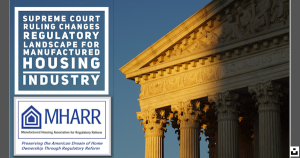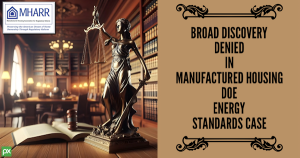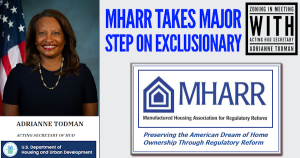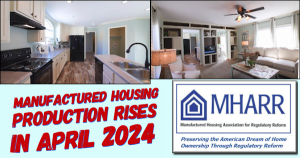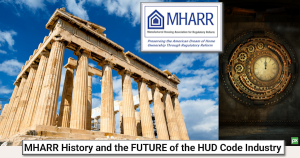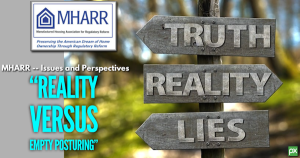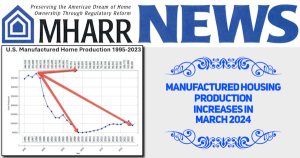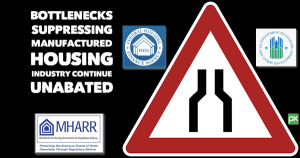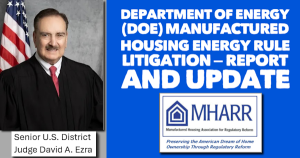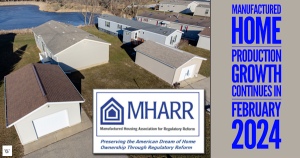‘MHI Does Not Represent the Entire Manufactured Housing “Industry”’ – MHARR Rebukes Manufactured Housing Institute Comments in Federal Response
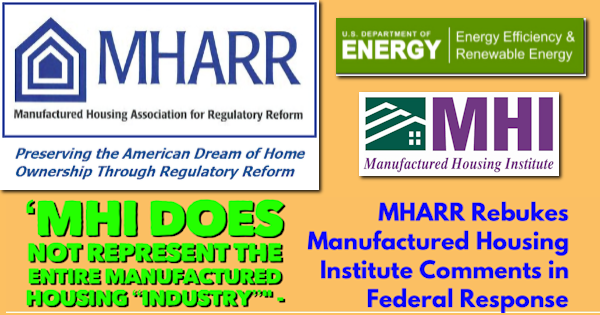
The Manufactured Housing Association for Regulatory Reform (MHARR) has filed supplemental comments with the U.S. Department of Energy (DOE) in its rulemaking docket for a Draft Environmental Impact Statement (EIS) concerning proposed manufactured housing “energy conservation” standards. MHARR’s supplemental comments copy attached, filed on March 4, 2022, correct and clarify inaccurate and presumptive characterizations contained in a so-called “Industry Proposal for Energy Efficiency Standards for Manufactured Housing,” attached as an “Appendix” to last-minute comments filed in the same rulemaking docket by the Manufactured Housing Institute (MHI).
In relevant part, “Appendix I” to MHI’s comments states that “MHI and the industry…” developed an “alternative manufactured housing energy standard” as set forth in the Appendix, “to provide a concrete example showing how a judicious increase in energy requirements can result in substantially improved energy efficiency and greater affordability.” (Emphasis added).
MHARR’s supplemental comments strongly object to any characterization of the MHI proposal as an “industry” initiative. First, MHI does not represent the entire manufactured housing “industry.” Any characterization of the MHI “alternative” standards proposal as an “industry” proposal, therefore, is false and misleading. Second, as MHARR’s initial comments in the Draft EIS rulemaking and in the preceding DOE manufactured housing energy standards rulemaking show, mainstream, modern HUD Code manufactured homes are already energy efficient, with average monthly energy costs below those of site-built homes for all tracked energy types. There is no basis, rationale, or need, accordingly, for an “increase” in manufactured housing energy requirements — “judicious” or otherwise – and no representative of any part of the industry should state, suggest, or imply otherwise, particularly when DOE’s energy proposal fails to meet the statutory criteria of both the Energy Independence and Security Act of 2007 or the Manufactured Housing Improvement Act of 2000.
MHARR acted immediately to disavow and correct this presumptuous misstatement insofar as it represents yet another in a string of strategic errors (including, but not limited to, one-sided procedural and substantive “compromises”) that have enabled DOE regulators to sidestep full compliance with EISA, the 2000 reform law and other applicable law, while repeatedly proposing draconian and destructive standards that would undermine manufactured housing as the preeminent source of non-subsidized, affordable homeownership for lower and moderate-income American families.
Particularly in light of the recent decision in Louisiana v. Biden, imposing a nationwide injunction against the DOE rule and others which rely in part on federal estimates of the “Social Cost of Carbon,” now is not the time to throw an undeserved “lifeline” to DOE regulators.
MHARR will continue to carefully monitor ongoing activity with respect to both the DOE manufactured housing energy rule and the related pending Social Cost of Carbon litigation, and will provide further updates as warranted. These matters will also be addressed in detail at the upcoming MHARR Board of Directors meeting.
cc: Other Interested HUD Code Manufactured Housing Industry Members and Consumer Groups
Manufactured Housing Association for Regulatory Reform (MHARR)
1331 Pennsylvania Ave N.W., Suite 512
Washington D.C. 20004
Phone: 202/783-4087
Fax: 202/783-4075
Email: MHARR@MHARRPUBLICATIONS.COM
Website: manufacturedhousingassociation.org

The Manufactured Housing Association for Regulatory Reform (MHARR) has filed supplemental comments with the U.S. Department of Energy (DOE) in its rulemaking docket for a Draft Environmental Impact Statement (EIS) concerning proposed manufactured housing “energy conservation” standards. MHARR’s supplemental comments copy attached, filed on March 4, 2022, correct and clarify inaccurate and presumptive characterizations contained in a so-called “Industry Proposal for Energy Efficiency Standards for Manufactured Housing,” attached as an “Appendix” to last-minute comments filed in the same rulemaking docket by the Manufactured Housing Institute (MHI).
In relevant part, “Appendix I” to MHI’s comments states that “MHI and the industry…” developed an “alternative manufactured housing energy standard” as set forth in the Appendix, “to provide a concrete example showing how a judicious increase in energy requirements can result in substantially improved energy efficiency and greater affordability.” (Emphasis added).
MHARR’s supplemental comments strongly object to any characterization of the MHI proposal as an “industry” initiative. First, MHI does not represent the entire manufactured housing “industry.” Any characterization of the MHI “alternative” standards proposal as an “industry” proposal, therefore, is false and misleading. Second, as MHARR’s initial comments in the Draft EIS rulemaking and in the preceding DOE manufactured housing energy standards rulemaking show, mainstream, modern HUD Code manufactured homes are already energy efficient, with average monthly energy costs below those of site-built homes for all tracked energy types. There is no basis, rationale, or need, accordingly, for an “increase” in manufactured housing energy requirements — “judicious” or otherwise – and no representative of any part of the industry should state, suggest, or imply otherwise, particularly when DOE’s energy proposal fails to meet the statutory criteria of both the Energy Independence and Security Act of 2007 or the Manufactured Housing Improvement Act of 2000.
MHARR acted immediately to disavow and correct this presumptuous misstatement insofar as it represents yet another in a string of strategic errors (including, but not limited to, one-sided procedural and substantive “compromises”) that have enabled DOE regulators to sidestep full compliance with EISA, the 2000 reform law and other applicable law, while repeatedly proposing draconian and destructive standards that would undermine manufactured housing as the preeminent source of non-subsidized, affordable homeownership for lower and moderate-income American families.
Particularly in light of the recent decision in Louisiana v. Biden, imposing a nationwide injunction against the DOE rule and others which rely in part on federal estimates of the “Social Cost of Carbon,” now is not the time to throw an undeserved “lifeline” to DOE regulators.
MHARR will continue to carefully monitor ongoing activity with respect to both the DOE manufactured housing energy rule and the related pending Social Cost of Carbon litigation, and will provide further updates as warranted. These matters will also be addressed in detail at the upcoming MHARR Board of Directors meeting.
cc: Other Interested HUD Code Manufactured Housing Industry Members and Consumer Groups
Manufactured Housing Association for Regulatory Reform (MHARR)
1331 Pennsylvania Ave N.W., Suite 512
Washington D.C. 20004
Phone: 202/783-4087
Fax: 202/783-4075
Email: MHARR@MHARRPUBLICATIONS.COM
Website: manufacturedhousingassociation.org




